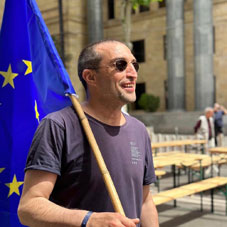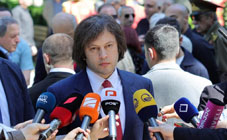Prosecutor's Office Appeals Acquittal of Doctor Arrested During Protests

Akhobadze's lawyer, Mariam Madzgarashvili, confirmed the appeal was filed on September 5. Prosecutor Shmagi Gobejishvili is leading the case. "The fight continues in the Tbilisi Court of Appeals. We will meet there," Madzgarashvili wrote.
On August 6, after nearly eight months of trial and pre-trial detention, Tbilisi City Court Judge Romeo Tkeshelashvili found the 43-year-old anesthesiologist-rheumatologist not guilty and ordered his immediate release.
The Prosecutor's Office announced shortly afterward that it would challenge the verdict.
Akhobadze is one of three demonstrators who were arrested and tried on drug-related charges following the protests.
Kobakhidze Downplays Reports of Violence Against Journalists at December Rallies

"There were not dozens of cases, there were two or three cases like this," Kobakhidze told reporters when asked why investigations had not been launched into alleged police abuse.
He argued that Georgia maintains what he called a "high legal standard" in handling protests. "Out of a thousand violent participants in the rally, only 30 are detained or imprisoned, that is, only 3 percent. The same standard naturally operates in relation to representatives of law enforcement agencies. The investigation will tell you the rest. If there is no indisputable evidence, if the guilty person is not identified, in this case, naturally, no charges can be brought," he said.
Challenged by a journalist who said there had been "dozens" of instances where police allegedly mistreated journalists or citizens, Kobakhidze reiterated that only a few incidents could reach the threshold for prosecution. "There were not dozens of cases that could be the subject of initiating a criminal investigation. There were two or three such cases. There were only a few cases that could potentially be criminal cases. Two or three, maybe four," he responded.
Kobakhidze added that relevant agencies hold detailed information about the cases, including reasons why certain individuals could not be identified. "You can request information from them as to why the relevant individuals could not be identified," he noted.
